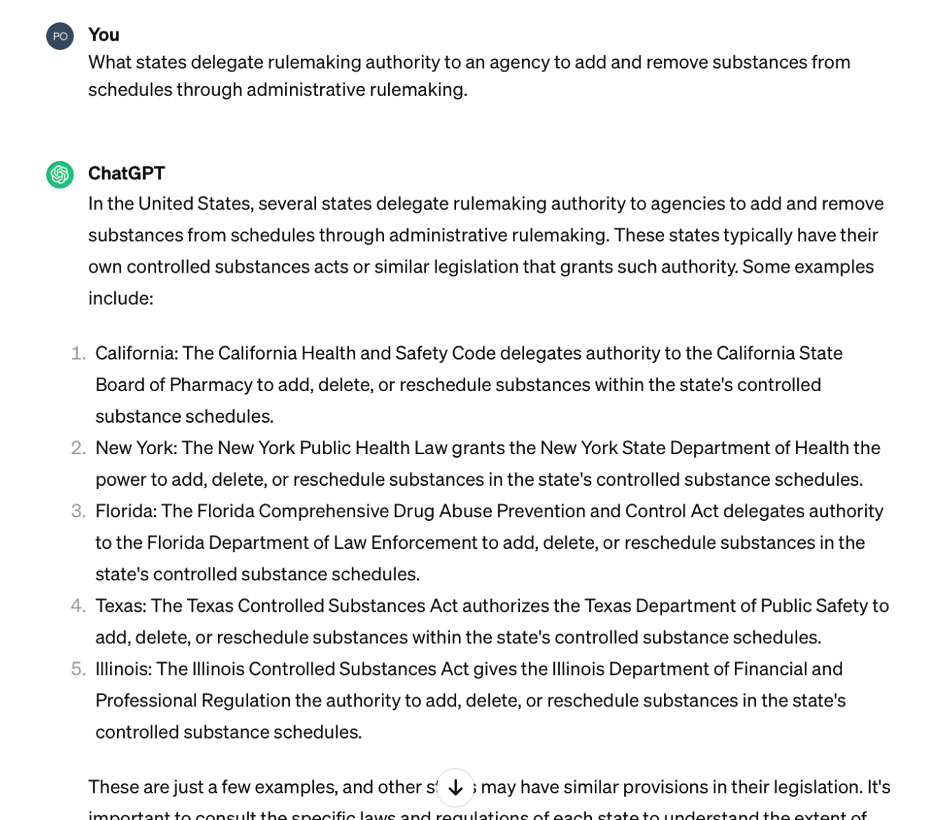We can expect that when the Legislature bans substances like Tianeptine or “gas station heroin,” then copycat drugs will pop up, maybe with a molecule in a complex organic compound changed here or there.
To go beyond listing dangerous drugs that are out there already, Texas and other states have enacted catch-all language that would list or cover “whack-a-mole” new drugs that people would discover or invent.

Texas, for instance, delegates authority for emergency action to a Commissioner, who can ban drugs without waiting for the legislature to act. The Commissioner’s bans sunset after a certain time, so the legislature does not cede ultimate authority. While other states have similar approaches, the Texas statute is illuminating.
https://statutes.capitol.texas.gov/Docs/HS/htm/HS.481.htm
Sec. 481.0355. EMERGENCY SCHEDULING; LEGISLATIVE REPORT. (a) Except as otherwise provided by Subsection (b) and subject to Subsection (c), the commissioner may emergency schedule a substance as a controlled substance if the commissioner determines the action is necessary to avoid an imminent hazard to the public safety.
(b) The commissioner may not emergency schedule a substance as a controlled substance under this section if:
(1) the substance is already scheduled;
(2) an exemption or approval is in effect for the substance under Section 505, Federal Food, Drug, and Cosmetic Act (21 U.S.C. Section 355); or
(3) the substance is an over-the-counter drug that qualifies for recognition as safe and effective under conditions established by federal regulations of the United States Food and Drug Administration governing over-the-counter drugs.
(c) Before emergency scheduling a substance as a controlled substance under this section, the commissioner shall consult with the Department of Public Safety and may emergency schedule the substance only in accordance with any recommendations provided by the department.
(d) In determining whether a substance poses an imminent hazard to the public safety, the commissioner shall consider:
(1) the scope, duration, symptoms, or significance of abuse;
(2) the degree of detriment that abuse of the substance may cause;
(3) whether the substance has been temporarily scheduled under federal law; and
(4) whether the substance has been temporarily or permanently scheduled under the law of another state.
(e) If the commissioner emergency schedules a substance as a controlled substance under this section, an emergency exists for purposes of Section 481.036(c) and the action takes effect on the date the schedule is published in the Texas Register.
(f) Except as otherwise provided by Subsection (f-1), an emergency scheduling under this section expires on September 1 of each odd-numbered year for any scheduling that occurs before January 1 of that year.
(f-1) The commissioner may extend the emergency scheduling of a substance under this section not more than once and for a period not to exceed one year by publishing the extension in the Texas Register. If the commissioner extends the emergency scheduling of a substance, an emergency exists for purposes of Section 481.036(c) and the action takes effect on the date the extension is published in the Texas Register.
(g) The commissioner shall post notice about each emergency scheduling of a substance or each extension of an emergency scheduling of a substance under this section on the Internet website of the Department of State Health Services.
(h) Not later than December 1 of each even-numbered year, the commissioner shall submit a report about each emergency scheduling action taken under this section during the preceding two-year period to the governor, the lieutenant governor, the speaker of the house of representatives, and each legislative standing committee with primary jurisdiction over the department and each legislative standing committee with primary jurisdiction over criminal justice matters.
(22) “Immediate precursor” means a substance the director finds to be and by rule designates as being:
(A) a principal compound commonly used or produced primarily for use in the manufacture of a controlled substance;
(B) a substance that is an immediate chemical intermediary used or likely to be used in the manufacture of a controlled substance; and
(C) a substance the control of which is necessary to prevent, curtail, or limit the manufacture of a controlled substance.
Nice job. I like the Whack-a-mo